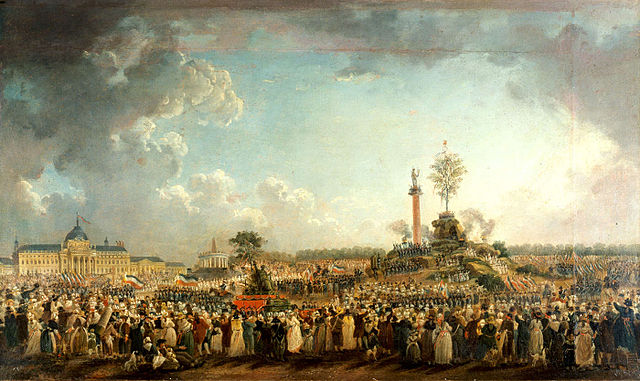1794
Robespierre inaugurates the Cult of the Supreme Being
When the French Revolution broke out in 1789 it seemed, at first, a moderate enough affair, demanding the sorts of rights that Americans or Englishmen would find unremarkable: freedom of the press, freedom from arbitrary arrest, an end to feudal oppression and a monarchy bound by a constitution. But social upheavals have lives of their own and often cannot be stopped even when early demands have been realized. The Revolution became increasingly radical, particularly in regard to religion. By 1790 ecclesiastical lands had been seized and the French Catholic Church severed from papal control; priests were forced to swear an oath of loyalty to this new “Constitutional church”, though many went underground or into exile; archbishops were deposed; bishops were henceforth to be elected. Churches were vandalized, despoiled of their treasures and their bells were melted down to make cannon for the revolutionary armies. Religious toleration, which had briefly been the order of the day, gave way to a policy of dechristianisation and a rejection of any worship of that “Jew slave” and his mother “the adulteress of Galilee”. Almost all of France’s 40,000 churches were closed by early 1794, sold or converted to stables, warehouses or factories. Notre Dame Cathedral was turned into a “Temple of Reason” with images of Liberty instead of crucifixes. Priests were murdered or forced to marry; public Christian worship was forbidden.
Maximilien Robespierre, the leading revolutionary figure, was no friend of Christianity but neither did he favour the sort of godless rationalism that other radicals wanted to advance. He sent proponents of “the Cult of Reason”, men like Jacques Hébert and Antoine-François Comoro, to the guillotine. He proposed instead the “Cult of the Supreme Being” which held to certain religious tenets such as the immortality of the soul, a moral code and a deity but which disavowed any other Christian practices. On May 7, 1794 the Assembly decreed the establishment of the new religion and proposed a grand public ceremony instituting it in early June. Robespierre’s part in this festival seemed to suggest that he had elevated himself to priestly status — he set fire to the Statue of Atheism and gave a sermon which concluded with:
Frenchmen, you war against kings; you are therefore worthy to honor Divinity. Being of Beings, Author of Nature, the brutalized slave, the vile instrument of despotism, the perfidious and cruel aristocrat, outrages Thee by his very invocation of Thy name. But the defenders of liberty can give themselves up to Thee, and rest with confidence upon Thy paternal bosom. Being of Beings, we need not offer to Thee unjust prayers. Thou knowest Thy creatures, proceeding from Thy hands. Their needs do not escape Thy notice, more than their secret thoughts. Hatred of bad faith and tyranny burns in our hearts, with love of justice and the fatherland. Our blood flows for the cause of humanity. Behold our prayer. Behold our sacrifices. Behold the worship we offer Thee.
Robespierre and his priestly pretensions inspired ridicule and helped to lead to his overthrow in July — the Thermidorian Reaction — and the extinction of his new cult.
